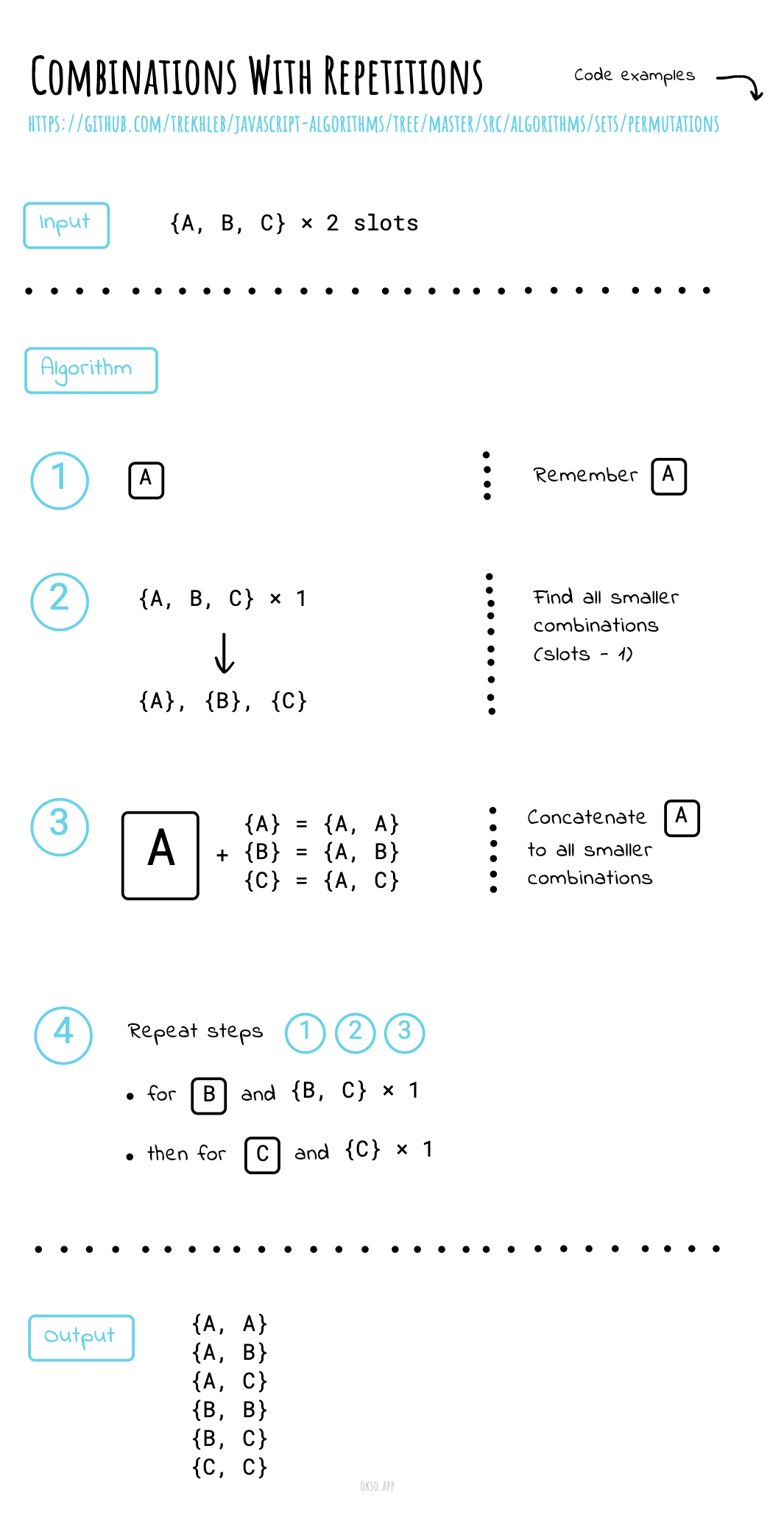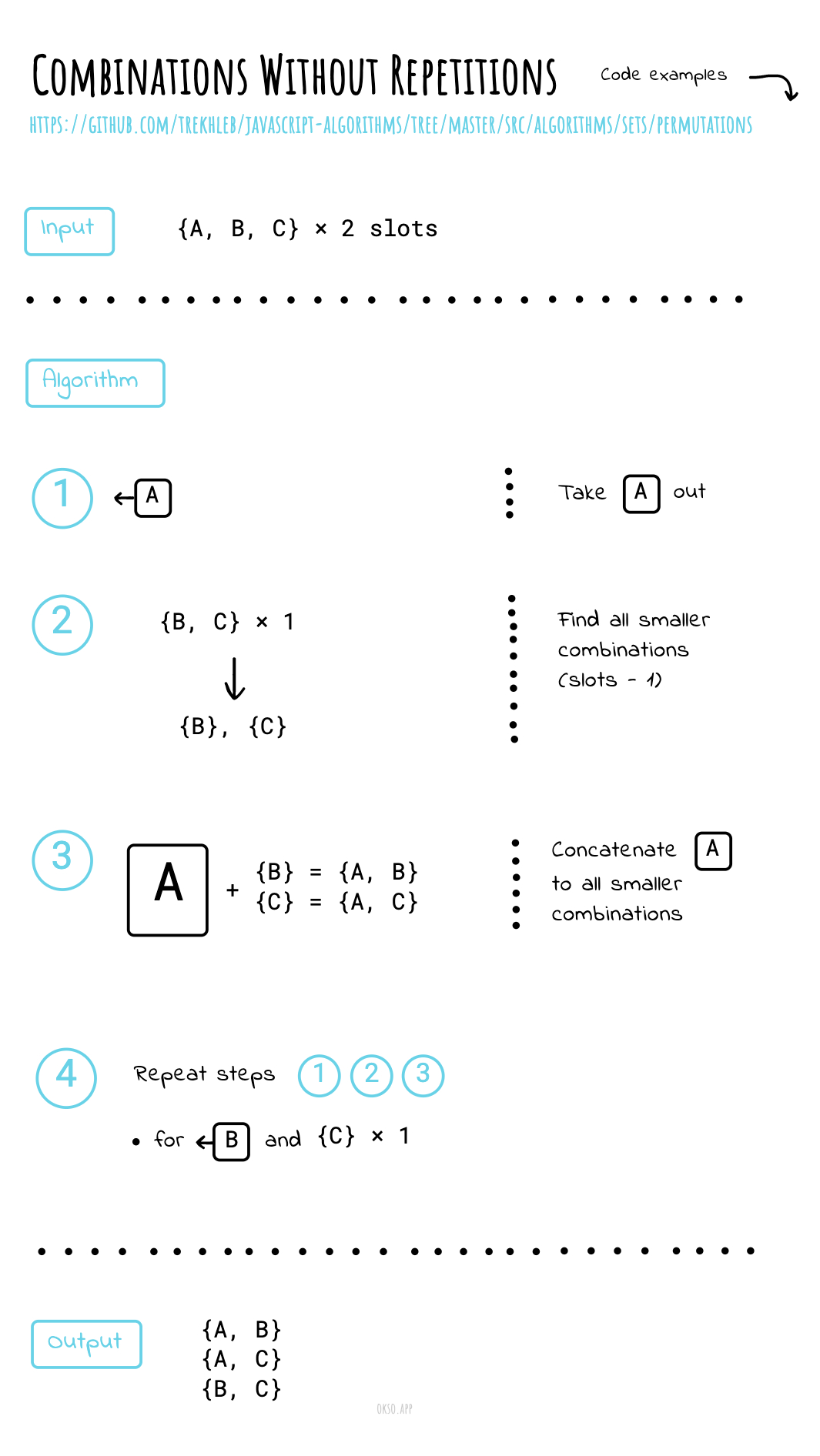# 《程序员数学:组合》- 有/无重复
作者:小傅哥
博客:https://bugstack.cn (opens new window)
源码:https://github.com/fuzhengwei/java-algorithms (opens new window)
沉淀、分享、成长,让自己和他人都能有所收获!😄
# 一、前言
与排列相对应的同类的会有组合数数学知识,就像双色球组合能有多少种,中奖概率是多少。同时对于数字是否可以重复使用,还包括重复组合和不重复组合。
举例;
不重复组合公式:

如彩票号码(2,14,15,27,30,33) ,哪里n是可供选择的东西的数量,我们从中选择r,没有重复,顺序无所谓。常称为“n选r”(如“16选3”)。也称为二项式系数。
可重复组合公式:

比如口袋里的硬币(5,5,5,10,10)
或者假设冰淇淋有五种口味 :banana、chocolate、lemon和。strawberry``vanilla
我们可以吃三勺。会有多少变化?
让我们用字母来表示口味:{b, c, l, s, v}。示例选择包括:
{c, c, c}(3 勺巧克力){b, l, v}(香蕉、柠檬和香草各一粒){b, v, v}(一根香蕉,两根香草)
n有多少东西可供选择,我们从中选择r。允许重复,顺序无关紧要。
# 二、实现
# 1. 不重复组合
public static List<List<String>> combineWithRepetitions(List<String> comboOptions, int comboLength) {
// If the length of the combination is 1 then each element of the original array
// is a combination itself.
if (comboLength == 1) {
List<List<String>> combos = new ArrayList<>();
for (String comboOption : comboOptions) {
List<String> combo = new ArrayList<>();
combo.add(comboOption);
combos.add(combo);
}
return combos;
}
// Init combinations array.
List<List<String>> combos = new ArrayList<>();
// Remember characters one by one and concatenate them to combinations of smaller lengths.
// We don't extract elements here because the repetitions are allowed.
for (int optionIndex = 0; optionIndex < comboOptions.size(); optionIndex++) {
// Generate combinations of smaller size.
String currentOption = comboOptions.get(optionIndex);
List<String> remainingOptions = new ArrayList<>(comboOptions.subList(optionIndex, comboOptions.size()));
List<List<String>> smallerCombos = combineWithRepetitions(remainingOptions, comboLength - 1);
// Concatenate currentOption with all combinations of smaller size.
for (List<String> smallerCombo : smallerCombos) {
List<String> combo = new ArrayList<>();
combo.add(currentOption);
combo.addAll(smallerCombo);
combos.add(combo);
}
}
return combos;
}
1
2
3
4
5
6
7
8
9
10
11
12
13
14
15
16
17
18
19
20
21
22
23
24
25
26
27
28
29
30
31
2
3
4
5
6
7
8
9
10
11
12
13
14
15
16
17
18
19
20
21
22
23
24
25
26
27
28
29
30
31

此代码是一个 Java 函数,它从允许重复的元素列表中生成给定长度的所有可能组合。 该函数有两个输入:
comboOptions:生成组合的元素列表。 2.comboLength:要生成的每个组合的长度。 该函数返回一个字符串列表列表,其中每个内部列表代表一个组合。 该函数的逻辑如下:- 如果
comboLength等于 1,则comboOptions列表中的每个元素本身就是一个组合并添加到combos列表中。 2. 如果comboLength大于 1,则该函数使用相同的函数生成更小尺寸的组合。对于列表中的每个元素,该函数通过使用当前选项之后的剩余选项调用自身来comboOptions生成元素组合。comboLength - 13. 最后,该函数将当前选项与每个较小的组合连接起来,并将结果添加到combos列表中。
# 2. 可重复组合
public static List<List<String>> combineWithoutRepetitions(String[] comboOptions, int comboLength) {
List<List<String>> combos = new ArrayList<>();
if (comboLength == 1) {
for (String comboOption : comboOptions) {
List<String> singleOption = new ArrayList<>();
singleOption.add(comboOption);
combos.add(singleOption);
}
return combos;
}
for (int i = 0; i < comboOptions.length; i++) {
String currentOption = comboOptions[i];
String[] smallerOptions = new String[comboOptions.length - i - 1];
System.arraycopy(comboOptions, i + 1, smallerOptions, 0, comboOptions.length - i - 1);
List<List<String>> smallerCombos = combineWithoutRepetitions(smallerOptions, comboLength - 1);
for (List<String> smallerCombo : smallerCombos) {
List<String> newCombo = new ArrayList<>();
newCombo.add(currentOption);
newCombo.addAll(smallerCombo);
combos.add(newCombo);
}
}
return combos;
}
1
2
3
4
5
6
7
8
9
10
11
12
13
14
15
16
17
18
19
20
21
22
23
24
2
3
4
5
6
7
8
9
10
11
12
13
14
15
16
17
18
19
20
21
22
23
24

这段代码是一个生成不含重复元素的组合的函数。
- 定义一个名为 "combos" 的列表,用于存储生成的组合。
- 如果 "comboLength" 等于 1,则对于 "comboOptions" 数组中的每一个元素,将其单独作为一个列表存入 "combos" 列表中。最后返回 "combos" 列表。
- 否则,对于 "comboOptions" 数组中的每一个元素,枚举它并作为组合的第一个元素,递归地调用该函数生成长度减 1 的组合。将枚举的元素加入生成的组合中,并将新生成的组合加入 "combos" 列表中。
- 最后返回 "combos" 列表。
# 三、测试
@Test
public void test_combineWithRepetitions() {
List<String> comboOptions = new ArrayList<>();
comboOptions.add("1");
comboOptions.add("2");
comboOptions.add("3");
List<List<String>> lists = Combinations.combineWithRepetitions(comboOptions, 2);
for (List<String> list : lists) {
System.out.println(JSON.toJSONString(list));
}
}
@Test
public void test_combineWithoutRepetitions() {
String[] comboOptions = {"1", "2", "3"};
List<List<String>> lists = Combinations.combineWithoutRepetitions(comboOptions, 2);
for (List<String> list : lists) {
System.out.println(JSON.toJSONString(list));
}
}
1
2
3
4
5
6
7
8
9
10
11
12
13
14
15
16
17
18
19
20
2
3
4
5
6
7
8
9
10
11
12
13
14
15
16
17
18
19
20
测试结果
["1","1"]
["1","2"]
["1","3"]
["2","2"]
["2","3"]
["3","3"]
Process finished with exit code 0
1
2
3
4
5
6
7
8
2
3
4
5
6
7
8
https://www.mathsisfun.com/combinatorics/combinations-permutations.html (opens new window)

